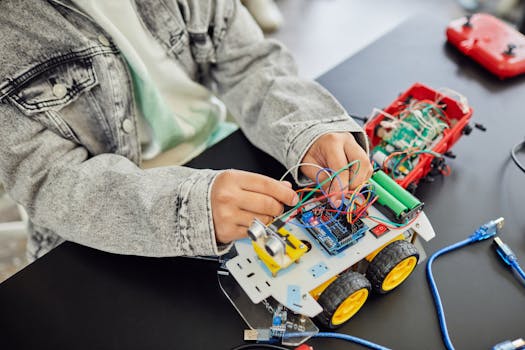happpy.news is an open source project, made with ♥ by reuben armstrong
and powered by this advert ^ from charity.marketing
Across Ghana, schoolchildren delve into robotics, honing critical tech skills for tomorrow’s workforce. Guided by passionate teachers, these budding innovators explore complex projects, shaping a bright future in science and engineering.

In recent years, Ghana has witnessed a significant shift in its educational landscape, particularly in the field of technology. Schools across the nation are integrating robotics into their curricula, providing students with invaluable skills that will prepare them for the demands of the future workforce. This initiative is not only enhancing students' understanding of science and engineering but also igniting their creativity and problem-solving abilities.
Robotics education in Ghana is more than just a trend; it’s a movement led by dedicated teachers who are passionate about equipping their students with the tools they need to thrive in a rapidly evolving technological world. From urban centers like Accra to rural communities, educators are implementing hands-on robotics projects that engage students and stimulate their interest in STEM (Science, Technology, Engineering, and Mathematics) fields.
In schools, children are learning to build robots from scratch, programming them to perform various tasks. This hands-on approach fosters a deeper understanding of complex concepts such as coding, electronics, and mechanics. As they work on these projects, students develop critical thinking skills and learn to collaborate effectively with their peers.
Organizations such as the Ghana Robotics Academy and various NGOs are playing a crucial role in this educational transformation. They provide resources, training, and workshops aimed at teachers and students alike. By facilitating access to technology and knowledge, these organizations are creating a supportive environment where innovation can flourish.
The impact of robotics education in Ghana is already evident. Students are not only gaining technical skills but also confidence in their abilities to tackle real-world problems. Many young innovators have participated in competitions, where they showcase their creations and compete with peers. These events foster a spirit of healthy competition and encourage students to push the boundaries of their creativity.
Furthermore, the focus on robotics is addressing a critical gap in the job market. As the world becomes increasingly reliant on technology, there is a growing need for skilled professionals in fields such as engineering, programming, and data science. By equipping students with these skills at an early age, Ghana is investing in its future workforce and creating opportunities for economic growth.
The enthusiasm for robotics is palpable among the students. Many express their dreams of becoming engineers, scientists, or tech entrepreneurs. Their aspirations are supported by the growing tech ecosystem in Ghana, which includes startups and tech hubs that are eager to nurture young talent. This synergy between education and industry is essential for fostering innovation and creativity.
In conclusion, Ghana’s focus on robotics education is a positive step towards shaping a brighter future for its youth. As students engage with technology in meaningful ways, they are not only preparing themselves for future careers but also contributing to the nation’s development. The commitment of teachers, organizations, and the community to fostering a culture of innovation will undoubtedly set the stage for Ghana to emerge as a leader in technology in the years to come. By investing in the potential of its children today, Ghana is ensuring a prosperous tomorrow.
Source: Grow Ghana